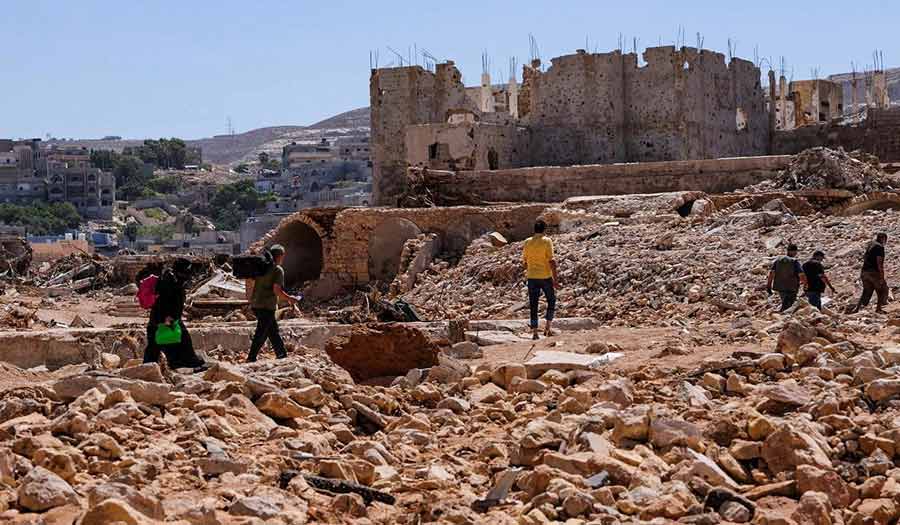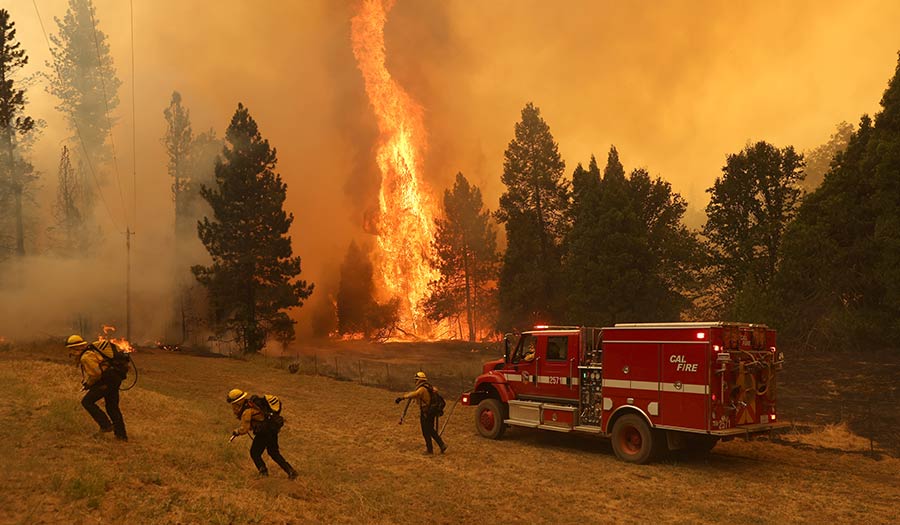 REUTERS/Esam Omran Al-Fetori
REUTERS/Esam Omran Al-Fetori
World News Desk
Learn the why behind the headlines.
Subscribe to the Real Truth for FREE news and analysis.
Subscribe NowDERNA, Libya (Reuters) – Residents of the devastated Libyan city of Derna desperately searched for missing relatives on Wednesday and rescue workers appealed for more body bags, after a catastrophic flood that killed thousands of people and swept many out to sea.
Swathes of the Mediterranean city were obliterated by a torrent of water unleashed by a powerful storm that swept down a usually dry riverbed on Sunday night, bursting dams above the city. Multi-story buildings collapsed with sleeping families inside.
Officials have put the number of missing at 10,000. The UN aid agency OCHA said the figure was at least 5,000.
Usama Al Husadi, a 52-year-old driver, has been searching for his wife and five children since the disaster. “I went by foot searching for them...I went to all hospitals and schools but no luck,” he told Reuters, weeping with his head in his hands.
Mr. Husadi, who had been working the night of the storm, dialed his wife’s phone number once again. It was switched off. “We lost at least 50 members from my father’s family, between missing and dead,” he said.
The beach was littered with clothes, toys, furniture, shoes and other possessions swept out of homes by the torrent.
Streets were covered in deep mud and strewn with uprooted trees and hundreds of wrecked cars, many flipped on their sides or onto their roofs. One car was wedged on the second-floor balcony of a gutted building.
“I survived with my wife but I lost my sister,” Mohamed Mohsen Bujmila, a 41-year-old engineer, said. “My sister lives downtown where most of the destruction happened. We found the bodies of her husband and son and buried them.”
He also found the bodies of two strangers in his apartment.
As he spoke, an Egyptian search-and-rescue team nearby recovered the body of his neighbor. “This is Aunt Khadija, may God grant her heaven,” Mr. Bujmila said.
The devastation is clear from high points above Derna, where the densely populated city center, built along a seasonal riverbed, was now a wide, flat crescent of earth with stretches of muddy water gleaming in the sun. Buildings were swept away.
Death tolls given by officials so far have varied, but all are in the thousands.
Hichem Abu Chkiouat, minister of civil aviation in the administration that runs eastern Libya, told Reuters more than 5,300 dead had been counted so far, and said the number was likely to increase significantly and might even double. The “sea is constantly dumping dozens of bodies,” he said by phone.
Tariq Kharaz, a spokesperson for the eastern authorities, said 3,200 bodies had been recovered, and 1,100 of them had yet to be identified.
Derna Mayor Abdulmenam al-Ghaithi told Saudi-owned Al Arabiya television the estimated the number of deaths in the city could reach 18,000 to 20,000 based on the number of districts destroyed by the flood.
Search and Rescue
Rescue teams have arrived from Egypt, Tunisia, the United Arab Emirates, Turkey, and Qatar, Mr. al-Ghaithi said.
“We actually need teams specialized in recovering bodies,” he said. “I fear that the city will be infected with an epidemic due to the large number of bodies under the rubble and in the water.”
The UN migration agency, the International Organization for Migration, said at least 30,000 people had been displaced in Derna.
“We need bags for the bodies,” Lutfi al-Misrati, the director of the search team, told Al Jazeera.
Rescue operations are complicated by deep political fractures in the country of 7 million people that has lacked a strong central government and been at war on-and-off since a NATO-backed uprising that toppled Muammar Gaddafi in 2011.
An internationally recognized Government of National Unity (GNU) is based in Tripoli, in the west, while a parallel administration operates in the east, including Derna.
Libya’s Tripoli-based Prime Minister Abdulhamid al-Dbeibah called the floods an unprecedented catastrophe. Libya’s Presidential Council head Mohammed al-Menfi has called for national unity.
The bodies of dozens of Egyptian migrants who were among the victims of the storm in Libya arrived on Wednesday in Beni Suef, about 68 miles south of Cairo, Egyptian media reported.
- Real Truth Magazine Articles
- WEATHER & ENVIRONMENT
 Billion-Dollar Disasters
Billion-Dollar Disasters
More on Related Topics:
- Residents Slog Through Flooded Streets, Clear Debris After Hurricane Milton Tore Through Florida
- A Week After Helene Hit, Thousands Still Without Water Struggle to Find Enough
- Hurricane Helene Kills at Least 90 in U.S., Homes and Memories Washed Away
- Portugal Declares a State of Calamity as Wildfires Rage Out of Control
- During Brazil’s Worst Drought, Wildfires Rage and the Amazon River Falls to a Record Low


